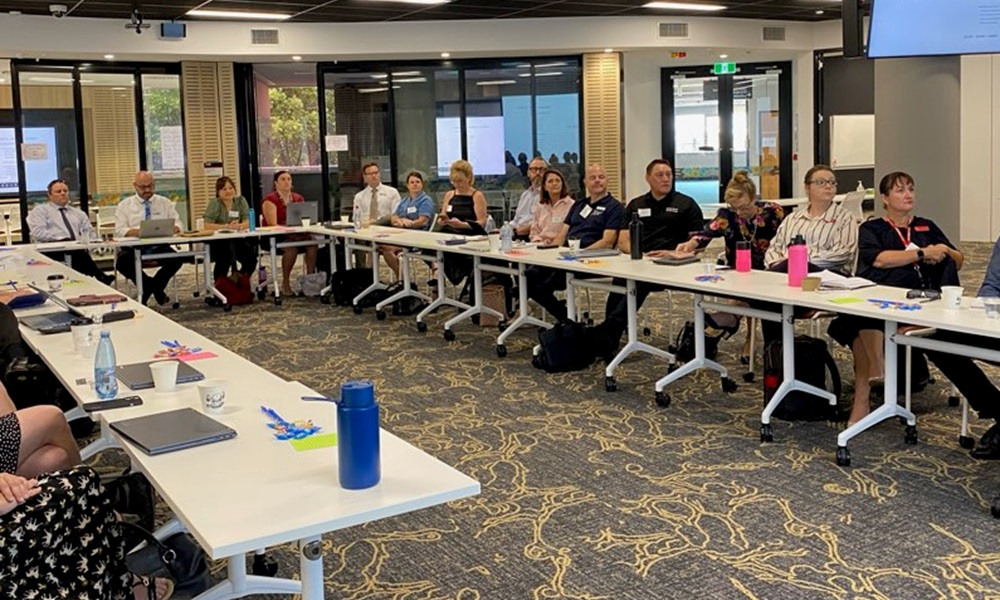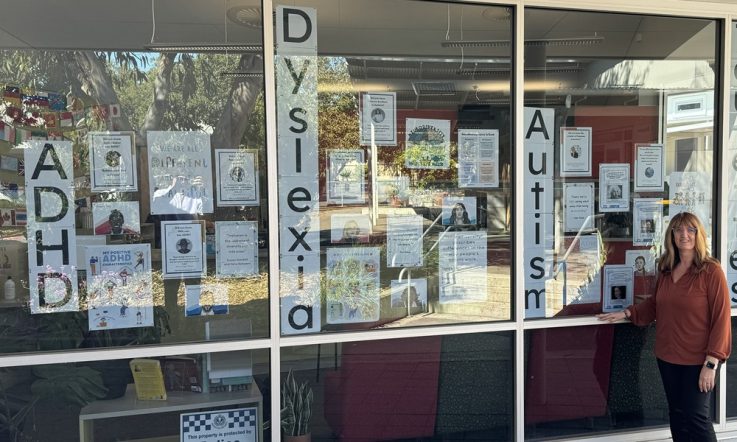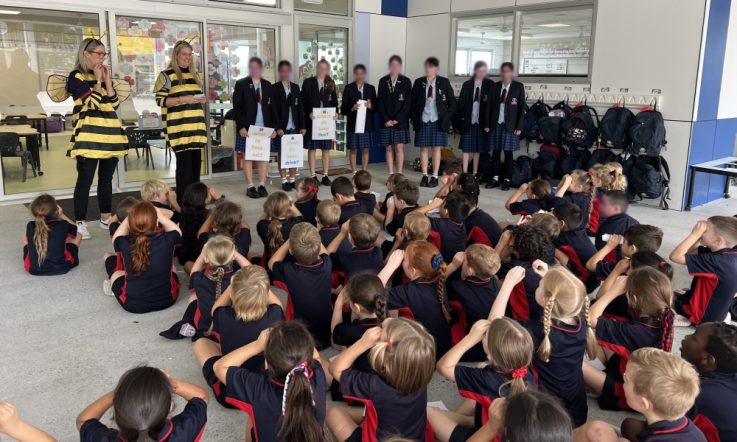The winners of the Teacher Awards 2024 have been announced!
This year, our Fostering Strong School-Community Partnerships award went to the team of principals, deputy principals, senior school and VET HODs, and the industry liaison officers at ENABLE – a coalition of 14 state secondary schools in Logan, Queensland. The ENABLE team were recognised for their Logan Education into Employment Roundtable (LEERT) partnership, which works with local council, local businesses, tertiary providers, and more, to address youth unemployment in their community.
In today’s article, we talk to Peta-Anne McNaught (Regional Project Officer, ENABLE), Donna Harvey (Deputy Principal, Beenleigh State High School), and Mark McCrystal (Innovation Lead, Logan City Council) about the ENABLE coalition and the award-winning Logan Education into Employment Round Table initiative.
Partnerships are often at the heart of the positive work that schools do. Whether it’s tapping into the expertise of a local university for research collaboration, or for upskilling staff, or working with local businesses to improve pathways for school leavers, partnerships allow schools to benefit from external resources and knowledge.
In Logan City, Queensland, a group of educators know the benefits of this better than most.
‘In 2007, principals of state secondary schools in Logan got together and decided that they need to work together, to improve the outcomes for students, connect their teachers and staff to each other and improve education across the region’, Peta-Anne McNaught, Regional Project Officer for ENABLE, tells Teacher. Seventeen years later the ENABLE Network of Schools has expanded to include 14 schools.
Through ENABLE, the schools work together across a range of areas – sharing best practice across curriculum and pedagogy, pooling together resources to fund external research and professional development, running inter-school events and external events and working towards shared goals through strategic community partnerships and programs.
‘Finding the time to network with other schools and the broader community isn't always easy, ENABLE provided me with a pre-established network that makes it much simpler. It opens the door to many programs and projects that wouldn’t have been possible otherwise,’ says Donna Harvey, Deputy Principal at one of the 14 ENABLE schools – Beenleigh State High School.
Just one of those projects has been the development of the Logan Education into Employment Roundtable (LEERT), a school-community partnership that addresses youth unemployment and one that impressed the Judging Panel.
‘The group of educators involved clearly identified a need in their school community and more broadly in their local area and have developed an effective initiative that is geared specifically towards what the community needs. Seeing the clear statistics that are improving the unemployment rate in the area and the ongoing engagement from both students and local businesses shows just how strong the community partnership is.’ (Teacher Awards 2024 judging panellist).
Identifying a need
Situated between Brisbane and the Gold Coast, Logan is a rapidly growing region. According to the award nomination, Logan has a large youth population and almost 26,000 registered businesses, yet it consistently has a high level of youth unemployment when compared to the rest of Australia, while also having a roughly 40% job vacancy rate.
That clear disconnect, where young people were without work and businesses were without workers, is what led to the development of LEERT.
Through LEERT, stakeholders (including Education Queensland; Department of Employment, Small Business and Training; TAFE QLD; Logan City Council; Griffith University; and the Federal Government's Local Jobs Program) can bring their unique perspectives, resources, connections, and data to the table to address a shared goal – in this case, reducing youth unemployment.
‘It’s in our best interest to have decreasing rates of unemployment and youth disengagement,’ says Mark McCrystal, Innovation Lead at Logan City Council. ‘Likewise, for State government, Federal Government, for the tertiary institutions and employers too, it’s a bit of a Venn diagram in that you have all these various players around the table but there is that central purpose there.’
Addressing that central purpose includes everything from businesses notifying schools of what jobs they have available to tertiary providers working with schools to develop clear pathways into higher or vocational study, or even teachers upskilling their own practices so they can better equip students with the essential 21st Century skills employers are looking for.
The data says it’s working too.
‘… our unemployment rate has reduced by 4.1%, going from 15% to 9.9% from February 2023-2024 which is a great result given the Australian average is 9.7%,’ says Harvey.
Bridge to Business
‘Flagship initiatives like Bridge to Business have directly connected students with employers, building their confidence and securing jobs. This program not only addresses immediate employment needs but also prepares students and educators for long-term success in the workforce, making a tangible difference in the community.’ (Teacher Awards 2024 judging panellist).
While LEERT has allowed a host of programs to flourish, such as mixer events for school staff and local businesses and bus tours for students to go visit local employers, Bridge to Business is the flagship event.
The annual expo brings together local businesses so they can meet graduating students from ENABLE’s 14 schools. Students get a direct opportunity to secure work – handing out CVs and conducting on the spot job interviews – while gaining valuable experience through networking and by learning more about the employers and their industries.
‘Confidence has also become an important outcome from Bridge to Business. Even if they don't land a job, students gain the confidence to approach employers,’ says Harvey.
Crucially, jobs are secured. Last year, several students were given offers on the day while around 25 others were contacted for follow-up interviews.
Jobs agencies are also on hand to engage with students and assist with the transition into the workforce and ENABLE now offers career education and a skills program to prepare students for the Bridge to Business event and the world of work beyond school.
Keeping it sustainable
Harvey feels that being part of a network, such as ENABLE, helps with keeping initiatives such as LEERT sustainable. For one, it gives them greater financial resources to not only collectively fund programs like LEERT, but resources, research, and McNaught’s role as Project Officer too.
‘I rely heavily on Peta-Anne as the Project Officer. Her extensive network across the 14 schools, all levels of government, as well as universities and TAFE, makes my job much easier.’
By having that person whose focus is working on those initiatives and partnerships, it means the ideas that are sparked during collaboration get actioned, and the day-to-day of those initiatives don’t overwhelm teaching staff.
‘In education we have a big skill shortage in staffing putting a lot of pressure in schools, so the challenge is time. People have a lot of great ideas but it’s the time and energy …’ says McNaught.
For McCrystal, he feels that ensuring everyone is traveling towards a common objective is also key.
‘It’s making sure that we have a clear line of sight to what that shared objective is and that we are adding value … you can’t really beat getting a bunch of people together in a room with a shared objective.’
Utilising the partnership’s resources
By utilising partnerships, the pool of resources available to schools is far greater and can make the success and sustainability of any initiatives much more likely. This could be everything from tapping into the knowledge and expertise of others, or simply using the connections those other organisations have already established.
For example, ENABLE has engaged third parties to assist with data-gathering.
‘Schools are very good at their own data collection and data analysis, but when you've got 14 schools coming together, [there’s a] different set of principles and complexities that need to govern that sort of data collection in terms of making sure it's valuable data. And that's why we start relying on external agencies to provide guidance and make sure it's meaningful, actionable data,’ says Harvey.
Likewise, by connecting with local employers, such as at one of LEERT’s mixer events for teachers and businesses, school staff make valuable connections and are better equipped to provide pathways for students.
‘… students might want to be an electrician, but how do you know who in your local community is taking on apprenticeships and what sorts of opportunities there are?’ says McNaught
The team also stress how by working so closely with McCrystal, the team at Logan City Council have been able to do a lot of the heavy lifting connecting with employers and assisting with grant applications – something that many school leaders struggle to balance.
‘Mark and his team do a lot of the heavy lifting organising employers to come into schools and organising bus tours for students and staff to engage with employers. Mark also worked with me to successfully apply for a Department of Employment, Small Business and Training grant that assisted with costs as well as engage an external agency to upskill students in resume writing and interview techniques in preparation for Bridge to Business,’ says McNaught.
What’s next?
With the success of Bridge to Business and increased funding from successful grants, LEERT is set to continue growing. Harvey tells Teacher that the foundations laid have already allowed them to expand into areas that go beyond broadly targeting youth unemployment – such as hosting an inaugural summit for Aboriginal and Torres Strait Islander students and the development of a sustainability network that connects STEM students to innovative practices in green industries.
‘There are many examples emerging from bringing all those key players together, enabling us to be innovative in how we support our students in their transition onto further studies or into the workforce.’
The Teacher Awards will be back for 2025! The Awards recognise work that’s been completed in the past 12 months, so it’s not too early to start thinking about your nomination for next year. You can browse the specific criteria for this award, and the other 7 categories, here.
How does your school use its role in the community to help address wider community issues, such as youth unemployment?
The ENABLE network of schools all share many similarities, for example, in their student demographics, the challenges their community faces, and the objectives they have. Could your school be partnering with other schools that share similar challenges and goals to better combine your resources and knowledge?



